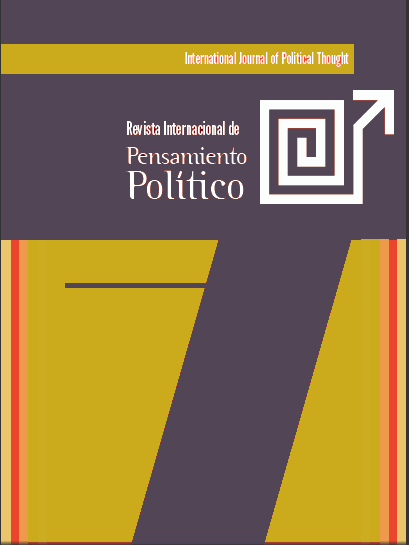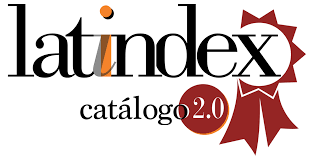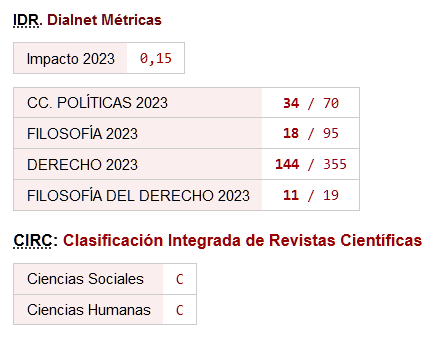Algorithms, politics and the problem of the transformation of democracy in the 21st century
DOI:
https://doi.org/10.46661/revintpensampolit.11089Keywords:
algorithms, democracy, governance, decisions, legitimacyAbstract
The new governance model based on algorithms (algocracy) involves a substantial modification of the principles and procedures of modern representative democracy. The attributes of speed, probity, transparency and impartiality put forward by its supporters generate, in the opinion of its detractors, a radical decrease in citizen protagonism in the deliberative processes of politics, replacing the public discussion of these matters with automated procedures of statistical data analysis. . Faced with these positions of adhesion and rejection, the strengthening of public reason would sustain a modality of moderate algocracy that, along with restoring the relevance of citizen participation, is compatible with a democracy conceived fundamentally from a deliberative conception of it.
Downloads
References
Aneesh, A. (2006). Virtual migration. The Programming of Globalization. Duke University Press. https://doi.org/10.1515/9780822387534 DOI: https://doi.org/10.1515/9780822387534
Ariaza-Rodríguez, S. (2019). “Teoría de la democracia griega”. Revista Científica General José María Córdova, 17 (27): 602-623. https://doi.org/10.21830/19006586.502 DOI: https://doi.org/10.21830/19006586.502
Asimov, I. (2018). Cuentos completos I. Barcelona: Penguin Random House.
Binns, R. (2018). “Algorithmic Accountability and Public Reason”. Philosophy & Technology, 31, pp. 543–556. https://link.springer.com/article/10.1007/s13347-017-0263-5 https://doi.org/10.1007/s13347-017-0263-5 DOI: https://doi.org/10.1007/s13347-017-0263-5
Bobbio, N. (2020). El futuro de la democracia. FCE: México.
Bodei, R. (2019). “Capitalismo algoritmo y democracia. Máquinas, inteligencia artificial y trabajo”. En (coord) Villar, S., y de Guadalupe, M. Poder, democracia y derechos. Una discusión con Michelangelo Bovero. Instituto de Investigaciones Jurídicas, UNAM: 275-289.
Bostrom, N. (2016). Superinteligencia. Caminos, peligros, estrategias. TEELL Editorial.
Cantarini, P. (2023). “Gobernanza algorítmica explicación por medio del diseño y justicia del diseño”. Anales de la Cátedra Francisco Suárez, 57: 121-141. https://doi.org/10.30827/acfs.v57i.25976 DOI: https://doi.org/10.30827/acfs.v57i.25976
Calvo, P. (2019). “Democracia algorítmica: consideraciones éticas sobre la dataficación de la esfera pública”, Revista del CLAD Reforma y Democracia, 74, pp. 5-30. https://doi.org/10.69733/clad.ryd.n74.a181 DOI: https://doi.org/10.69733/clad.ryd.n74.a181
Cortés, A. (2014). “El concepto de accountability: una mirada desde la Ciencia Política”. Cuadernos de Ciencias Políticas, 6: 15-25.
Coulanges, F. (2020). La ciudad antigua. Mexico: Porrúa.
Danaher, J. (2016). “The Threat of Algocracy: Reality, Resistance and Accommodation”, Philosophy and Technology, 29 (3), pp. 245-268. https://link.springer.com/article/10.1007/s13347-015-0211-1 https://doi.org/10.1007/s13347-015-0211-1 DOI: https://doi.org/10.1007/s13347-015-0211-1
Estrada, A., Cerón, W. (2021). “Un acercamiento al concepto de democracia desde los presupuestos sociales, políticos y filosóficos”. Analecta Política, 11 (21): 272-298. https://doi.org/10.18566/apolit.v11n21.a05 DOI: https://doi.org/10.18566/apolit.v11n21.a05
García, D., Valle, D. (2019). “Los impactos de la ideología técnica y la cultura algorítmica en la sociedad: una aproximación crítica”. Revista de Estudios Sociales, 71: 15-27. https://doi.org/10.7440/res71.2020.02 DOI: https://doi.org/10.7440/res71.2020.02
Giménez, S. (2024). Informe OBS: Evolución del mercado de RRSS en 2024. OBS Business School. https://www.obsbusiness.school/actualidad/informes-de-investigacion/evolucion-del-mercado-de-las-rrss-2024
Gutiérrez, M. E. (2021). “Administraciones inteligentes y acceso al código fuente y los algoritmos públicos. Conjurando riesgos de cajas negras decisionales”. Revista Derecom, 31: 19-105,
Hidalgo, C. (2018). Augmented Democracy. https://www.peopledemocracy.com/
Juárez, G., Romeu, J., Pineda, C. (2016). “La accountability pública: un concepto abierto”. Praxis Sociológica, 21: 95-119.
Moreno, A. (2023). “Datos, algoritmos y política en los procesos electorales”. Revista PPV. https://revistappv.com.ar/datos-algoritmos-y-politica-en-los-procesos-electorales/
Morozov, E. (2014). “The Real Privacy Problem”, MIT Technology Review. https://www.technologyreview.com/2013/10/22/112778/the-real-privacy-problem/#:~:text=As%20Web%20companies%20and%20government,because%20democracy%20is%20at%20risk.
Pedraza, E., Martínez, P. (2022). “Algoritmos y democracia: impacto, peligro y propuestas regulatorias”. Revista Pensamiento Jurídico, 56: 91-113.
Petitte, H. (2020). “Could Russia's president one day be a ROBOT? Alisa AI software that claims 'enemies of the people will be shot' wins the backing of 40,000 to stand against Vladimir Putin”, Mail Online. https://www.dailymail.co.uk/sciencetech/article-5166847/Russian-AI-Alisa-wins-backing-40-000-election-run-up.html
Sartori, G. (2007). ¿Qué es la democracia? Taurus: Madrid.
Sadin, E. (2018). La humanidad aumentada. Caja Negra.
Sahd, J., Zovatto, D., y Rojas, D. (2024). Riesgo político América Latina. Santiago: Ediciones Centro Estudios Internacionales, Pontificia Universidad Católica de Chile.
Sierra, F. (2021). “Ciudadanía digital y democracia 4.0. Un programa de investigación”. En Sierra, F., Leetoy, S., Gravante, T. (Ed.), Democracia inconclusa: Movimientos sociales, esfera pública y redes digitales: 23-62.
Touraine, A. (2000). ¿Qué es la democracia? FCE: México.
Tucídides (2014). Historia de la guerra del Peloponeso. Madrid: Alianza.
Urban, B. (2022). “Pensar y Procesar. Una crítica a los sistemas democráticos basados en Inteligencia Artificial desde el reconocimiento, el compromiso y la justicia”. Revista de Filosofía, 79: 190-200. https://doi.org/10.4067/S0718-43602022000100190 DOI: https://doi.org/10.4067/S0718-43602022000100190
Vicente, M. (2023). “Inteligencia Artificial y política: los casos de The Synthetic Party y Tama”, en Dafonte-Gómez, A., Míguel-González, M. (Coords). El fenómeno de la desinformación: reflexiones, casos y propuestas. Madrid: Dykinson, pp. 603-617.
Wagner, M. (2020). “This virtual politician wants to run for office”, CNN Businnes. https://edition.cnn.com/2017/11/23/tech/first-virtual-politician-trnd/index.html
Villarroel, R. (2023). “Algocracia. Decisiones políticas y representación ciudadana en una gobernanza algorítmica”. Otrosiglo, Revista de filosofía, 7 (2): 193-212.
Wu. T. (2003). “Network Neutrality, Broadband Discrimination”. Journal of Telecommunications and High Technology Law, 2, pp. 141-176. https://doi.org/10.2139/ssrn.388863 DOI: https://doi.org/10.2139/ssrn.388863
Downloads
Published
How to Cite
Issue
Section
License
Copyright (c) 2024 Daniel Santibañez Guerrero

This work is licensed under a Creative Commons Attribution-NonCommercial-ShareAlike 4.0 International License.
Open access policy
Free and open access is allowed to any interested party to all the contents of the journal issues, free of charge, being able to print and transfer all the articles, with the only condition of specifying the source and authorship.
The journal: a) does not charge authorship costs for the processing of articles or for their submission, b) maintains copyright for authors without restrictions, c) facilitates authors to keep their publication rights without limitations.
The International Journal of Political Thought is an original work of the Laboratory of Political Ideas and Practices of the Pablo de Olavide University. All articles included in the Journal are original work of their respective authors. This Journal is freely offered to the scientific and academic community at no cost and releases the contents according to the license "Attribution-NonCommercial-ShareAlike 4.0 CC BY-NC-SA" of the Creative Commons project available in the following url: https://creativecommons.org/licenses/by-nc-sa/4.0/legalcode
If you wish to translate or compile any of the articles available here, please contact us at contacto












 ISSN: 1885-589X
ISSN: 1885-589X  Universidad Pablo de Olavide
Universidad Pablo de Olavide